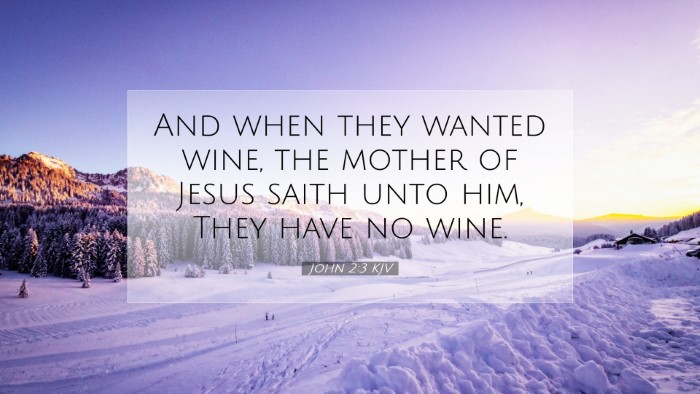Old Testament
Genesis Exodus Leviticus Numbers Deuteronomy Joshua Judges Ruth 1 Samuel 2 Samuel 1 Kings 2 Kings 1 Chronicles 2 Chronicles Ezra Nehemiah Esther Job Psalms Proverbs Ecclesiastes Song of Solomon Isaiah Jeremiah Lamentations Ezekiel Daniel Hosea Joel Amos Obadiah Jonah Micah Nahum Habakkuk Zephaniah Haggai Zechariah MalachiJohn 2:3
John 2:3 KJV
And when they wanted wine, the mother of Jesus saith unto him, They have no wine.
John 2:3 Bible Commentary
Commentary on John 2:3
Verse Context: John 2:3 states, "And when they wanted wine, the mother of Jesus saith unto him, They have no wine." This verse situates us in a social setting where the absence of wine would signify a failure of hospitality, reflecting the cultural expectations of the time.
Overview of the Passage
This event occurs during the wedding at Cana, a significant moment in Jesus's early ministry. Mary's notice of the lack of wine initiates the first recorded miracle of Jesus, setting the stage for his divine authority and compassion.
Theological Insights
From theological perspectives, this verse denotes more than a mere observation; it shows Mary's familiarity with Jesus's capabilities and her implicit trust in his power. The lack of wine also serves as a metaphor for human needs and the limitations of earthly provisions.
Commentaries by Notable Scholars
Matthew Henry
Matthew Henry emphasizes the significance of Mary's role in this passage, observing that her approach to Jesus reveals a deep understanding of his identity and mission. He notes that the lack of wine not only reflects a physical need but also a spiritual one, suggesting that it symbolizes the joy and abundance found in Christ alone.
- Spiritual Insight: Henry contends that Mary’s awareness of the situation illustrates her faith in Jesus's ability to address human deficiencies.
- Cultural Context: He discusses the importance of wine in Jewish celebrations, highlighting how its absence could taint the memory of the occasion.
Albert Barnes
Albert Barnes provides a detailed analysis of both the literal and symbolic implications of this miracle. He remarks on the social significance of wine in biblical times, suggesting that Mary’s statement indicates her concern not only for the hosts but for the reputation of Jesus as well.
- Humanity's Need: Barnes emphasizes the universal human experience of lack, relating it to the spiritual and physical needs we all encounter.
- Mary's Faith: He highlights the implicit faith shown by Mary, which can serve as an exemplary model for believers in seeking Jesus in times of need.
Adam Clarke
Adam Clarke focuses on the significance of the miracle, pointing out that it is an introduction to the public ministry of Jesus. He notes that Mary's direct appeal signifies her confidence in Jesus’s capabilities and readiness to perform the miraculous.
- Symbolism of Wine: Clarke draws attention to the symbolism of wine in the Scriptures, often representing joy and celebration, thus connecting it to the essence of Jesus's mission.
- Nature of Christ's Mission: He argues that this miracle is a demonstration of Jesus’s compassion and willingness to meet human needs, suggesting it foreshadows the greater miracle of salvation.
Practical Applications
The commentary on John 2:3 offers valuable lessons for pastors, theologians, and students of the Bible. Recognizing the importance of addressing both spiritual and physical needs is crucial in ministry. The passage exhorts believers to bring their needs before Jesus, trusting in his ability to provide abundantly.
- Faith in Action: Like Mary, we are encouraged to acknowledge our needs candidly to the Lord, understanding that he is both aware and willing to intervene.
- Understanding Divine Timing: The ensuing dialogue between Mary and Jesus serves as a reminder of the importance of divine timing in responding to our requests.
Conclusion
In summary, John 2:3 serves as a pivotal reminder of the intersection of humanity's needs and divine provision. The insights from Matthew Henry, Albert Barnes, and Adam Clarke collectively illustrate the rich layers of meaning embedded in this simple yet profound incident. This commentary not only enriches our understanding of the text but encourages a deeper reliance on Christ's provision in our own lives.


